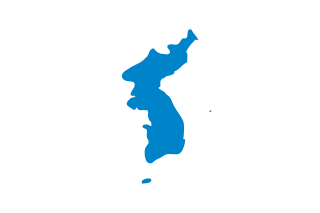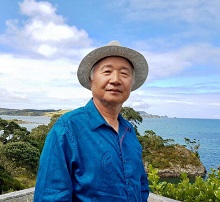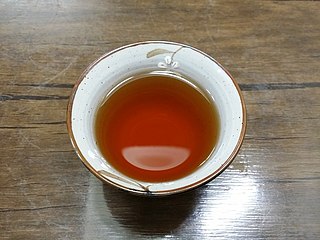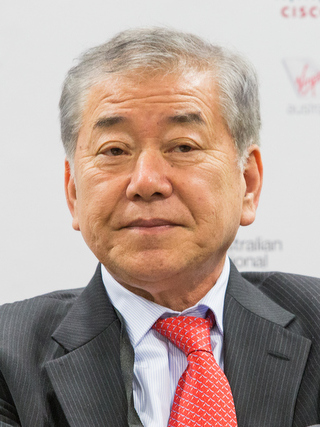
Korea is a peninsular region in East Asia. Since 1945, it has been divided at or near the 38th parallel, now known as the Korean Demilitarized Zone. In 1948, two states declared independence, both claiming sovereignty over all of Korea: South Korea comprising its southern half and North Korea comprising its northern half. The region consists of the Korean Peninsula, Jeju Island, and minor islands near the peninsula. The peninsula is bordered by China to the north and Russia to the northeast, across the Amnok and Duman rivers. It is separated from Japan to the southeast by the Korea Strait.

South Korea, officially the Republic of Korea (ROK), is a country in East Asia. It constitutes the southern part of the Korean Peninsula and borders North Korea along the Korean Demilitarized Zone; though it also claims the land border with China and Russia. The country's western border is formed by the Yellow Sea, while its eastern border is defined by the Sea of Japan. South Korea claims to be the sole legitimate government of the entire peninsula and adjacent islands. It has a population of 51.96 million, of which roughly half live in the Seoul Capital Area, the ninth most populous metropolitan area in the world. Other major cities include Busan, Daegu and Incheon.

The Lower Paleolithic era on the Korean Peninsula and in Manchuria began roughly half a million years ago. The earliest known Korean pottery dates to around 8000 BC, and the Neolithic period began after 6000 BC, followed by the Bronze Age by 2000 BC, and the Iron Age around 700 BC. Similarly, according to The History of Korea, the Paleolithic people are not the direct ancestors of the present Korean people, but their direct ancestors are estimated to be the Neolithic People of about 2000 BC.

Green tea is a type of tea that is made from Camellia sinensis leaves and buds that have not undergone the same withering and oxidation process which is used to make oolong teas and black teas. Green tea originated in China, and since then its production and manufacture has spread to other countries in East Asia.

Joseon, officially Great Joseon State, was a dynastic kingdom of Korea that lasted just over 500 years. It was founded by Taejo of Joseon in July 1392 and replaced by the Korean Empire in October 1897. The kingdom was founded following the aftermath of the overthrow of Goryeo in what is today the city of Kaesong. Early on, Korea was retitled and the capital was relocated to modern-day Seoul. The kingdom's northernmost borders were expanded to the natural boundaries at the rivers of Amnok and Tuman through the subjugation of the Jurchens.

The First Republic of Korea was the government of South Korea from August 1948 to April 1960. The first republic was founded on 15 August 1948 after the transfer from the United States Army Military Government that governed South Korea since the end of Japanese rule in 1945, becoming the first independent republican government in Korea. Syngman Rhee became the first president of South Korea following the May 1948 general election, and the National Assembly in Seoul promulgated South Korea's first constitution in July, establishing a presidential system of government.

The siege of Busanjin was a battle fought at Busan on 24 May 1592, between Japanese and Korean forces. The attacks on Busan and the neighboring fort of Dadaejin were the first battles of the Japanese invasions of Korea (1592–98).
The siege of Namwon was a military engagement that occurred from 23 September to 26 September 1597. It ended in Japanese victory.

Hongik University is a private university in Seoul, South Korea. Founded by an activist in 1946, the university is located in Mapo-gu district of central Seoul, South Korea with a second campus(branch campus) in Sejong.
The Battle of Sangju was a battle during the Japanese invasions of Korea (1592–98). After capturing Busan and Dongnae, the Japanese army under Konishi Yukinaga advanced at a rapid rate of almost 20 kilometer per day towards the Joseon capital of Hanseong.
The Battle of Sacheon (泗川) was a siege by Korean and Chinese forces against the Japanese fortification of Sacheon from 6 to 11 November 1598. It ended in Japanese victory.

Lee Seung-Heun, better known as Ilchi Lee, is a South Korean author and the founder of a variety of mind-body training methods, including Body & Brain, Brain Wave Vibration, Kookhak Qigong, and DahnMuDo, all falling under the umbrella name "Brain Education". Lee started teaching his methods in a park in the 1980s, and since then, the practice has developed into an international network of for-profit and non-profit entities. Lee's practices have been criticized as pseudoscience, and his organizations as a cult.

The territorial conquests of the Japanese Empire in the Western Pacific Ocean and East Asia began in 1895 with its victory over Qing China in the First Sino-Japanese War. Subsequent victories over the Russian Empire and the German Empire expanded Japanese rule to Taiwan, Korea, Micronesia, southern Sakhalin, several concessions in China, and the South Manchuria Railway. In 1931, Japan invaded Manchuria, resulting in the establishment of the puppet state of Manchukuo the following year; thereafter, Japan adopted a policy of founding and supporting puppet states in conquered regions. These conquered territories became the basis for the Greater East Asia Co-Prosperity Sphere in 1940.
The Battle of Jiksan was a military conflict fought between Ming and Japanese forces on 16 October 1597. It resulted in withdrawal by both sides. However the battle marked the furthest point the Japanese ever got to reaching Hanseong during the Second Invasion.

Bak Jiwon, styled Yeonam, was a philosopher and novelist in the late Joseon dynasty. He has been regarded as one of the greatest thinkers of the so-called "Practical Learning (silhak)" movement. Park Jiwon belonged to the "School of Profitable Usage and Benefiting the People" to promote the industrialization of his country and the development of trade by positively introducing western technologies to Joseon Korea. Park Jiwon proposed that Joseon import advanced technologies from the Qing dynasty, and promote mercantilism.

Lee Seung-taek is a Korean interdisciplinary artist. He is a sculptor, an installation artist, and a performance artist—conceptualizing in the notion of "anti-concept" or "anti-art" in the Korean art scene.
Chinese influence on Korean culture can be traced back as early as the Goguryeo period; these influences can be demonstrated in the Goguryeo tomb mural paintings. Throughout its history, Korea has been greatly influenced by Chinese culture, borrowing the written language, arts, religions, philosophy and models of government administration from China, and, in the process, transforming these borrowed traditions into distinctly Korean forms.

Gyeolmyeongja-cha or sicklepod tea is a tea made from roasted seeds of Senna spp., especially S. obtusifolia and S. tora.

Moon Chung-in is a Special Advisor to President Moon Jae-in of South Korea for Foreign Affairs and National Security. He is also a Distinguished University Professor of Yonsei University, Krause Distinguished Fellow, School of Policy and Global Strategy, University of California, San Diego, and co-Convener of the Asia-Pacific Leadership Network for Nuclear Non-Proliferation and Disarmament (APLN). He is currently serving as the editor-in-chief of Global Asia. On 21 May 2017, Moon Chung-in was nominated by President Moon Jae-in as a special advisor on unification, diplomacy and national security affairs.

Pueraria montana var. lobata, the East Asian arrowroot, or kudzu vine, is a perennial plant in the family Fabaceae.















